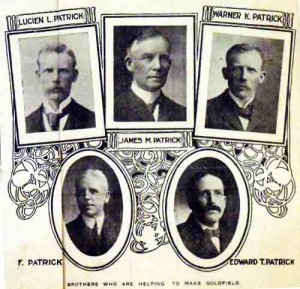The brothers are:
James McCall – June 12, 1848 – Feb. 27, 1918
William Francis – May 3, 1853 – July 20, 1905
Warner Knox – May 1858 – May 30, 1914
Edward Thomas – Feb. 2, 1861 – Mar. 14, 1924
Lucien Linton – Sept. 24, 1863 – Nov. 25, 1944
James has been hard to pin down. I haven’t been able to find any newspaper biographies on him like the other brothers have. He seems to have joined his father, uncle, and cousin William Knox in the lumber businesses and then was a clerk in the St. Louis City Treasurer’s office when his father was Treasurer. I haven’t found any indication that he attended college. He was married a month after Will in February 1881. I don’t know if the newlyweds lived with his family or hers or a place of their own.
William known as Will or W. F., graduated from Washington University in 1872 with a Bachelor of Arts and in 1874 he earned a Masters in Engineering, also from Wash U. In 1875 he joined the Newton-Jenney Expedition to the Dakotas as an assayer. He stayed on in the Dakotas to do a little prospecting but by 1876, he was in Georgetown at one of the reduction works and in 1877 he was in partnership in an assaying shop. In 1878, he moved to Leadville and formed a partnership with another assayer.
Warner was the quiet one of the family. He never married. He attended Washington University, but I don’t know if he graduated nor do I know what he studied. He was the first of the brothers to join Will in Leadville.
Edward graduated from Washington University Law School in 1884. He practiced in St. Louis for a while and then moved to Chicago, where he remained several years. By 1893 he had moved to Denver and was participating with his brothers in several mining ventures.
Lucien was the youngest and wildest of the brothers. There is a letter from their father, James to Will in 188? complaining about the trouble Lucien was in, again! Lucien attended the Manual Training School which was part of Washington University.
1880s
The 1880 Census shows that Warner had joined Will in Leadville and was probably assisting him in his mines. Will had an assaying business in Leadville, but had also invested in a couple mines in the Ten Mile District to north of Leadville, just over Fremont Pass. In January 1881, Will married Annie and they moved to Kokomo in the Ten Mile District for several months while the sale of the Aftermath mine was finalized. They sold their cabin for $500 and moved to Leadville only a few months before the entire town burned down.
Will was still listed in the Leadville business directories as an assayer until 1883. During this time, he and a partner were offered interest in a mine that was later named the Colonel Sellers Mine on Iron Mountain, near the bend to the south in California Gulch. This mine was very successful and Will was the managing partner until 1893/94.
James seems to have divided his time between Leadville and Denver in the 1880s. He pops up occasionally in newspaper articles about the Col. Sellers. In 1886, the Denver business directory lists him as a dealer in lime and stone. The stone was probably red sandstone that was being quarried around Lyons, Colorado.
Warner is also mentioned occasionally in newspaper articles about the Col. Sellers. The 1886 Leadville business directory lists him as the Superintendent of the Col. Sellers. By 1888, he started to develop a mine of his own in Rico, CO. He called his silver/zinc mine the “88” and worked it for several years. It was never a big producer, just enough to keep him in Rico for several years. The 1889 Denver business directory listed Warner as living in Denver with his parents and involved in milling along with Lucien. So it seems that he traveled back and forth from Rico and Denver.
Lucien started working in Leadville after he, his parents, and sisters moved to Denver in 1886. He had learned a little about mining at the Manual Training School in St. Louis, and could have attended Wash U college courses on mining.
Stay tuned for Part II

